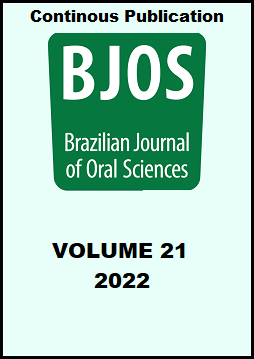Abstract
Aim: In Brazil, COVID-19 remains one of the epicenters of the pandemic, thus, presential educational activities are suspended. The study aimed to describe the approach of flipped classroom performed to provide social distancing and to maintain teaching activities during COVID-19-pandemic. Methods: Flipped Classroom was chosen to be associated with the role-play technique as a central methodology. To bring students closer to activities performed in the non-pandemic period, some actions and assessments were also role-played by Professor simulating patients in virtual meetings. Results: Although the changes in the format of the lessons, our approaches stimulated the students maintained the high frequency of students in the activities (almost 100%) providing continuity activities. Conclusions: This report can reinforce that meaningful learning can be taught by using a virtual/remote approach. However, the potential positive results observed cannot be used as an excuse to maintain remote teaching activities with the objective of cost-cutting by the institutions.
References
WHO. World Health Organization. WHO Coronavirus Disease (COVID-19) Dashboard. [real time] [cited 2020 Sep 7]. Available from: https://covid19.who.int.
Chisini LA, Costa FDS, Salvi LC, demarco FF. Endodontic treatments in the Brazilian Public Health System: influence of COVID-19 pandemic. Health Pol Technol. 2021 Jun;10(2):100514. doi: 10.1016/j.hlpt.2021.100514.
WHO. World Health Organization. Coronavirus disease (COVID-19) Situation Report – 195. 2020 Aug 2 [cited 2020 Aug 3]. Available from: https://www.who.int/docs/default-source/coronaviruse/situation-reports/20200802-covid-19-sitrep-195.pdf?sfvrsn=5e5da0c5_2.
Chisini L, Sartori L, Costa F, Salvi L, Demarco F. COVID-19 pandemic impact on prosthodontics treatments in the Brazilian Public Health System. Oral Dise. 2022;28(Suppl. 1):994-6.
Chisini LA, Costa FDS, Demarco GT, da Silveira ER, Demarco FF. COVID-19 pandemic impact on paediatric dentistry treatments in the Brazilian Public Health System. Int J Paediatr Dent. 2021 Jan;31(1):31-4. doi: 10.1111/ipd.12741.
Chisini LA, Castilhos ED, Costa FDS, D'Avila OP. Impact of the COVID-19 pandemic on prenatal, diabetes and medical appointments in the Brazilian National Health System. Rev Bras Epidemiol. 2021 May 28;24:e210013. doi: 10.1590/1980-549720210013.
Chisini LA, Costa FDS, Sartori LRM, Corrêa MB, D'Avila OP, Demarco FF. COVID-19 Pandemic impact on Brazil's Public Dental System. Braz Oral Res. 2021 Jul 16;35:e082. doi: 10.1590/1807-3107bor-2021.vol35.0082.
Aquilanti L, Gallegati S, Temperini V, Ferrante L, Skrami E, Procaccini M, et al. Italian Response to Coronavirus Pandemic in Dental Care Access: The DeCADE Study. Int J Environ Res Public Health. 2020 Sep 24;17(19):6977. doi: 10.3390/ijerph17196977.
Liu X, Zhou J, Chen L, Yang Y, Tan J. Impact of COVID-19 epidemic on live online dental continuing education. Eur J Dent Educ. 2020 Nov;24(4):786-9. doi: 10.1111/eje.12569.
Sukumar S, Dracopoulos SA, Martin FE. Dental education in the time of SARS-CoV-2. Eur J Dent Educ. 2021 May;25(2):325-31. doi: 10.1111/eje.12608.
Gurgel BCV, Borges SB, Borges REA, Calderon PDS. COVID-19: Perspectives for the management of dental care and education. J Appl Oral Sci. 2020 Sep 28;28:e20200358. doi: 10.1590/1678-7757-2020-0358.
Parsegian K, Ayilavarapu S, Gardner AL, Angelov N. Predoctoral periodontal education and COVID-19: Challenges, actions, and learned lessons. J Dent Educ. 2020 Oct 4:10.1002/jdd.12451. doi: 10.1002/jdd.12451.
Quinn B, Field J, Gorter R, Akota I, Manzanares MC, Paganelli C, et al. COVID-19: The immediate response of european academic dental institutions and future implications for dental education. Eur J Dent Educ. 2020 Nov;24(4):811-4. doi: 10.1111/eje.12542.
Halasa S, Abusalim N, Rayyan M, Constantino RE, Nassar O, Amre H, Set al. Comparing student achievement in traditional learning with a combination of blended and flipped learning. Nurs Open. 2020 Mar 31;7(4):1129-38. doi: 10.1002/nop2.492.
Ausubel DP. The acquisition and retention of knowledge: a cognitive view. Kluwer Academic Publishers; 2000.
Vanka A, Vanka S, Wali O. Flipped classroom in dental education: A scoping review. Eur J Dent Educ. 2020 May;24(2):213-226. doi: 10.1111/eje.12487.
Zayyan M. Objective structured clinical examination: the assessment of choice. Oman Med J. 2011 Jul;26(4):219-22. doi: 10.5001/omj.2011.55.
Donn J, Scott JA, Binnie V, Bell A. A pilot of a Virtual Objective Structured Clinical Examination in dental education. A response to COVID-19. Eur J Dent Educ. 2021 Aug;25(3):488-94. doi: 10.1111/eje.12624.
Ferraz APCM, Belhot RV. Bloom’s taxonomy and its adequacy to define instructional objective in order to obtain excellence in teaching. Gest Prod. 2010;17(2):421-31. doi: 10.1590/S0104-530X2010000200015.

This work is licensed under a Creative Commons Attribution 4.0 International License.
Copyright (c) 2021 Luiz Alexandre Chisini, Marcus Cristian Muniz Conde, Alessandro Menna Alves, Francine dos Santos Costa


